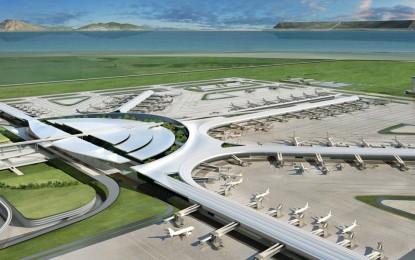
NEW AIRPORT. One of the design studies for the New Manila International Airport (NMIA), a four-runway gateway that San Miguel Corporation plans to build in Bulacan. (Artist's perspective courtesy of SMC)
MANILA -- San Miguel Corporation has engaged the services of global firms Groupe ADPi, Meinhardt Group and Jacobs to design and build its PHP734-billion proposed New Manila International Airport in Bulacan (NMIA).
All three companies were involved in building world-class airports, including Singapore’s Changi Airport, Atlanta Airport and France’s Charles de Gaulle Airport.
The initial designs, some of which were released earlier, envision a future-ready airport focusing on overall passenger experience, and sustainable technologies consistent with the needs of the environment and the local communities of Bulacan and nearby provinces.
SMC said it will also engage a world-class airport operator to help manage the country’s future premier gateway.
“This is our biggest investment in a single project to date, one that will definitely impact the lives of millions of Filipinos and the country in general - all the more reason for us to push for greater sustainability and choose the best people to work with us,” SMC president and COO Ramon Ang said.
Meanwhile, Ang assured fisherfolk who will be affected by the project that they will have better homes in relocation sites with fishing power boats to easily re-establish their livelihood.
“This project’s success is anchored on helping support the local fishing industry. We are in the process of identifying areas where together we can build a fishing community that will last for generations to come. We want Bulacan to eventually become the seafood capital of the Philippines where seafood is exported to other countries, and tourists come in droves to sample them--similar to what happened to Japan’s Tsukiji for so many years,” Ang said.
SMC said it hopes to be able to set the stage for a meaningful and productive engagement soon as it gets final approval from the government.
Ang reiterated that this project would “provide more and better livelihood opportunities, not to take them away; ensure environmental balance and enhance resilience against calamities, because it’s the right thing to do".
He added that as soon as SMC gets final approval from the government, it would officially start meaningful and productive engagement with all concerned stakeholders, especially the affected communities.
Benefits of the NMIA
SMC is building its proposed airport on a 2,500 hectare property in Bulakan, Bulacan, about 30 kilometers northeast of Metro Manila at no cost to the government.
The proposed airport is designed to address the capacity needed today amid the existing airport congestion at the Ninoy Aquino International Airport, while allowing for future expansion. It will be capable of accommodating 20 million passengers a year who will enjoy the benefits of world-class facilities.
As a catalyst to development, NMIA is expected to fuel trillion of dollars in economic activity annually; create an estimated 20 million direct and indirect jobs; bring in 30 million foreign tourists in the country; and, most of all, decongest Metro Manila with plans to integrate the complex to a larger infrastructure ecosystem that includes new and existing expressways and mass transit systems.
This will also bring Bulacan’s local economy, together with adjacent provinces, to unprecedented levels of growth.
“Bulacan’s local industries will not only survive, they will also grow. With a major international airport at their doorstep, fisherfolk, micro entrepreneurs, and local businesses will have a huge, ready market for their products, and even a means to ship them to other provinces or export them,” Ang said. (PR)
